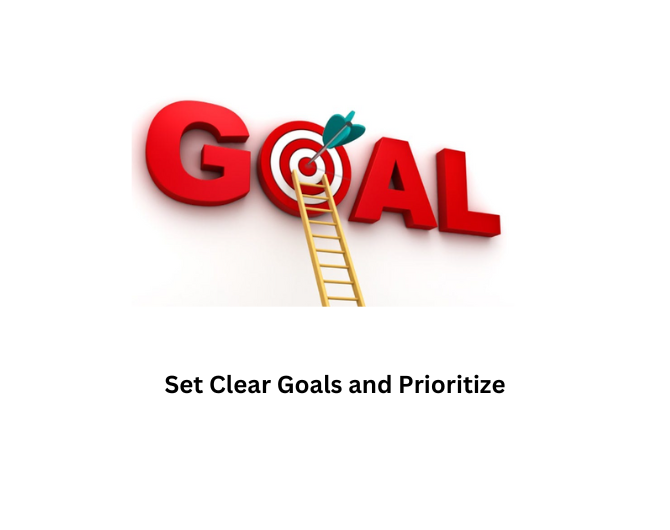Mastering the Art of Time Management: 5 Tips for a Productive Day
In the fast-paced world we live in, mastering the art of time management is crucial for achieving productivity and success. With the constant demands of work, personal life, and other responsibilities, it’s easy to feel overwhelmed and struggle to make the most out of each day. In this comprehensive guide, we’ll explore various time management techniques, productivity tools, and effective planning strategies to help you streamline your day and enhance your overall productivity.
Time Management: 5 Tips for a Productive Day
So, let’s explore each tip in briefly for a successful life.
1- Set Clear Goals and Prioritize:

One of the fundamental principles of effective time management is setting clear goals and priorities. Begin by outlining your short-term and long-term objectives, both personally and professionally. This clarity will serve as a roadmap, helping you allocate time and resources efficiently. Prioritize tasks based on their importance and deadlines to ensure that you focus on what truly matters.
Expert Advice: Renowned productivity expert, Stephen Covey, emphasizes the importance of identifying tasks based on urgency and importance. He suggests using the Eisenhower Matrix, a powerful tool for time management that categorizes tasks into four quadrants: important and urgent, not important but urgent, most urgent and most important, and not important and not urgent. This matrix can guide your decision-making process and help you allocate time wisely.
2- Effective Planning Strategies:

Planning is a key component of time management. Break down your goals into smaller, manageable tasks and create a daily or weekly schedule. Utilize tools such as calendars, planners, or digital apps to organize your tasks and set reminders. This proactive approach ensures that you stay on track and minimizes the chances of forgetting essential responsibilities.
Expert Advice: Time management expert, Brian Tracy, recommends the “Eat That Frog” technique, which involves tackling your most challenging or important task first thing in the morning. By addressing your most significant task early, you set a positive tone for the rest of the day and avoid procrastination.
3- Utilize Productivity Tools:

In the digital age, numerous productivity tools can assist you in managing your time effectively. Explore task management apps like Todoist or Trello to create to-do lists and track your progress. Time-tracking tools like RescueTime help you understand how you spend your time, enabling you to make informed adjustments for better efficiency.
Expert Advice: David Allen, productivity guru and author of “Getting Things Done,” emphasizes the importance of a comprehensive organizational system. His GTD method involves capturing all tasks in an external system, processing and organizing them, and regularly reviewing and updating your task list. This systematic approach can significantly enhance your time management skills.
4- Avoid Multitasking:

Contrary to popular belief, multitasking can hinder rather than enhance productivity. Focus on one task at a time to ensure quality work and efficient use of time. Set specific time blocks for different activities, allowing you to give each task your full attention without feeling overwhelmed.
Expert Advice: Neuroscientist Earl Miller explains that the brain is not designed for multitasking. Instead, it switches between tasks, leading to reduced efficiency and increased stress. By concentrating on one task at a time, you optimize your cognitive abilities and improve overall productivity.
5- Regular Breaks and Self-Care:

A well-rested mind is a productive mind. Incorporate regular breaks into your schedule to prevent burnout and maintain focus. Engage in activities that rejuvenate you, such as taking a short walk, practicing mindfulness, or enjoying a quick meditation session. Prioritizing self-care contributes to sustained productivity throughout the day.
Expert Advice: Tony Schwartz, author of “The Power of Full Engagement,” emphasizes the importance of managing energy rather than time. By incorporating breaks and self-care activities, you recharge your energy levels, leading to improved focus and overall productivity.
Let’s add a section on different types of tasks and their importance levels, integrating the Eisenhower Matrix philosophy into the article:
4 Types of Tasks and Importance Levels:

Understanding the nature of tasks and their relative importance is crucial for effective time management. Renowned productivity expert Stephen Covey introduced the Eisenhower Matrix, a powerful tool that categorizes tasks based on their urgency and importance. Let’s delve into the four quadrants and explore how they can guide your prioritization strategy.
1- Important and Urgent:
- These tasks require immediate attention and contribute significantly to your long-term goals.
- Examples include pressing deadlines, emergencies, or critical projects.
Philosophy: Address these tasks promptly to prevent crises and ensure you stay on course with your overall objectives.
2- Not Important but Urgent:
- Tasks in this category may demand immediate action but do not necessarily align with your broader goals.
- Examples include interruptions, some emails, or minor issues that require quick resolution.
Philosophy: Delegate or minimize time spent on these tasks to free up resources for more crucial activities.
3- Most Urgent and Most Important:
- The sweet spot where tasks align both in urgency and importance, representing high-priority items.
- These tasks are key drivers of your success and require focused attention.
Philosophy: Devote a significant portion of your time to these tasks, ensuring they receive the attention they deserve for optimal results
4- Not Important and Not Urgent:
- Low-priority tasks that neither contribute significantly to your goals nor demand immediate attention.
- Examples include non-essential meetings, some routine administrative tasks, or time-wasting activities.
Philosophy: Minimize or eliminate these tasks whenever possible, freeing up time for more impactful endeavors.
Expert Advice Integration: Time management expert Brian Tracy often emphasizes the significance of distinguishing between what is urgent and what is important. By applying the principles of the Eisenhower Matrix, you can make informed decisions about where to allocate your time and energy. Remember, effective time management isn’t just about being busy; it’s about investing your time wisely in activities that align with your goals.
By incorporating the Eisenhower Matrix into your daily routine, you gain a structured approach to prioritize tasks based on their true significance. This method allows you to focus on what matters most, leading to increased productivity and a more fulfilling work-life balance.
Conclusion
In conclusion, mastering the art of time management involves not only planning and productivity tools but also a strategic approach to task prioritization. Embrace the principles of the Eisenhower Matrix, and you’ll find yourself making more informed decisions, achieving your goals efficiently, and ultimately leading a more balanced and productive life. Further, by following these 5 tips for a productive day you can improve your self a lot.
Looking for a freelance work? Click here to find the best platform 5 World Popular Freelancing Websites 2024




3 Comments